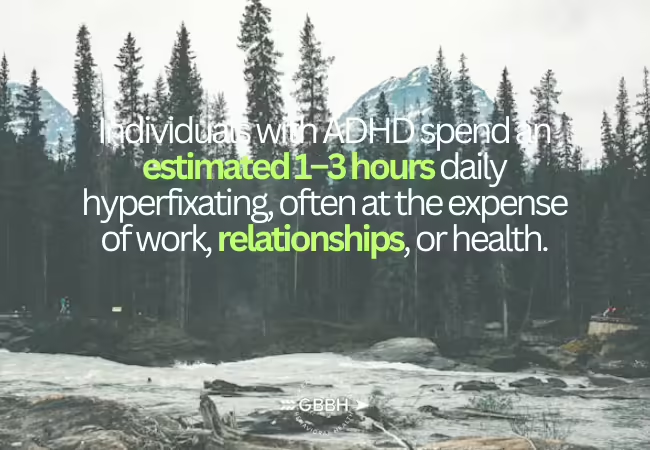Hyperfixation is a state of intense concentration or focus on a particular activity, subject, or interest to the exclusion of all else. While hyperfixation can occasionally lead to increased productivity or the acquisition of specialized knowledge, it often interferes with daily responsibilities, relationships, and emotional well-being. This mental state is commonly associated with neurodivergent conditions such as ADHD and autism spectrum disorder (ASD) but can also occur in individuals dealing with anxiety, depression, or trauma.
For individuals in Boston, understanding and managing hyperfixation is crucial for maintaining a balanced lifestyle. Accessing professional support through behavioral health in Boston, anxiety treatment programs, depression treatment programs, and structured care options like Intensive Outpatient Programs (IOPs) and Partial Hospitalization Programs (PHPs) can provide strategies to address hyperfixation effectively.
What is Hyperfixation?
Hyperfixation is characterized by an overwhelming focus on a single activity or interest, often accompanied by difficulty transitioning to other tasks. It can be a double-edged sword: while it enables deep engagement and expertise in specific areas, it can also disrupt routines and prevent individuals from fulfilling responsibilities.
Key Characteristics of Hyperfixation
- Becoming fully absorbed in an activity or interest for extended periods.
- Ignoring basic needs, such as eating, sleeping, or socializing, while hyperfixating.
- Struggling to disengage, even when the activity becomes unproductive or repetitive.
- Experiencing feelings of guilt, frustration, or shame after hyperfixating and realizing neglected priorities.
Hyperfixation can appear episodic, lasting for hours, days, or even weeks, depending on the individual and the activity.
Causes of Hyperfixation
Hyperfixation stems from a combination of neurobiological, psychological, and emotional factors. Understanding these causes is essential for effective management.
1. Neurodivergence
- ADHD: Individuals with ADHD often experience hyperfixation due to their challenges with attention regulation. The brain’s reward system prioritizes activities that feel stimulating, making it hard to shift focus.
- Autism Spectrum Disorder (ASD): Hyperfixation on specific topics of interest is a common feature of ASD, providing comfort, joy, or a sense of control.
2. Emotional Coping Mechanisms
- Anxiety and Depression: Hyperfixation can serve as a way to escape overwhelming emotions, offering a temporary sense of purpose or distraction.
- Trauma Responses: People with unresolved trauma may hyperfixate on activities that feel safe or controllable, such as repetitive tasks or hobbies.
3. Neurological Factors
- Dopamine Deficiency: Many neurodivergent individuals have lower levels of dopamine, a neurotransmitter responsible for pleasure and motivation. Hyperfixation can create a temporary dopamine boost, making the activity feel rewarding.
4. External Stressors
- Chronic stress or feelings of powerlessness in daily life may lead individuals to hyperfixate as a form of emotional self-regulation.
Symptoms of Hyperfixation
Hyperfixation affects individuals differently, but common symptoms include emotional, cognitive, and behavioral patterns that disrupt daily functioning.
1. Emotional Symptoms
- Heightened Excitement: Intense feelings of joy or satisfaction during hyperfixation.
- Irritability: Frustration or anger when interrupted.
- Guilt or Shame: Regret after realizing the extent of time spent hyperfixating.
2. Cognitive Symptoms
- Narrow Focus: Difficulty concentrating on anything outside the area of hyperfixation.
- Intrusive Thoughts: Persistent mental preoccupation with the subject or activity.
- Loss of Time Awareness: Becoming so engrossed in the activity that hours pass unnoticed.
3. Behavioral Symptoms
- Neglecting Responsibilities: Avoiding work, chores, or social obligations to focus solely on the hyperfixation.
- Repetitive Actions: Engaging in the same behavior or researching the same topic repeatedly.
- Social Withdrawal: Avoiding interactions with loved ones to maintain focus.
Impact of Hyperfixation on Daily Life
Hyperfixation can have both positive and negative effects, depending on its frequency, intensity, and impact on daily functioning.
1. Professional and Academic Challenges
- Missed Deadlines: Spending excessive time on non-priority tasks or activities.
- Reduced Productivity: Struggling to multitask or manage time effectively.
- Workplace Conflicts: Frustration from colleagues or supervisors over missed responsibilities.
2. Relationship Struggles
- Neglect of Loved Ones: Friends and family may feel ignored or undervalued when hyperfixation takes precedence.
- Communication Barriers: Difficulty discussing anything outside the area of focus.
- Emotional Distance: Relationships may weaken due to social withdrawal.
3. Physical and Mental Health
- Neglect of Basic Needs: Skipping meals, sleep, or exercise during hyperfixation.
- Increased Anxiety or Depression: Feelings of inadequacy or frustration after hyperfixating.
- Burnout: Overexertion in the hyperfixated activity, leading to exhaustion.
How to Manage Hyperfixation
Managing hyperfixation involves developing self-awareness, implementing strategies to balance focus, and seeking professional support when needed.
1. Develop Self-Awareness
- Track Patterns: Maintain a journal to identify when hyperfixation occurs and what triggers it.
- Mindfulness Practices: Techniques like meditation can help you recognize when you’re becoming overly fixated.
2. Create Healthy Boundaries
- Set Time Limits: Use timers or alarms to remind yourself to take breaks.
- Schedule Activities: Allocate specific periods for hyperfixation while balancing other responsibilities.
3. Engage in Dopamine-Boosting Activities
- Exercise Regularly: Physical activity increases dopamine levels naturally, reducing reliance on hyperfixation for stimulation.
- Explore Multiple Interests: Diversifying hobbies can prevent over-reliance on a single focus area.
4. Practice Self-Care
- Prioritize sleep, healthy eating, and regular relaxation to maintain physical and emotional balance.
- Take intentional breaks from hyperfixation to recharge and prevent burnout.
5. Seek Professional Support
- Therapy-Based Interventions:
- Cognitive-Behavioral Therapy (CBT): Helps identify thought patterns contributing to hyperfixation and teaches strategies for focus management.
- Trauma Therapy Program: Addresses unresolved emotional triggers that drive hyperfixation.
- Group Therapy Program: Offers a supportive environment to share experiences and learn from others.
- Family Therapy Program: Enhances understanding and communication among loved ones.
6. Utilize Structured Programs
For individuals whose hyperfixation significantly disrupts daily life, structured mental health programs like IOPs or PHPs provide intensive support.
Why Professional Support is Essential
Hyperfixation, particularly when linked to ADHD, ASD, or trauma, often requires professional guidance for effective management. A mental health treatment center in Boston can provide comprehensive care tailored to individual needs.
Benefits of Professional Support
- Individualized Treatment Plans: Tailored approaches to address the underlying causes of hyperfixation.
- Skill Development: Practical strategies for balancing focus and responsibilities.
- Improved Relationships: Strengthened communication and understanding with loved ones.
- Long-Term Resilience: Tools and techniques to prevent hyperfixation from interfering with daily life.
How Greater Boston Behavioral Health Can Help
At Greater Boston Behavioral Health, we offer specialized programs to help individuals manage hyperfixation and its underlying causes. Our services include:
- Anxiety and Depression Treatment Programs: Address co-occurring conditions that often accompany hyperfixation.
- Trauma Therapy Programs: Help process emotional triggers and develop healthy coping mechanisms.
- Family Therapy Programs: Strengthen relationships and foster understanding.
- Group Therapy Programs: Build connections and learn strategies in a supportive environment.
- Intensive Outpatient Programs (IOPs) and Partial Hospitalization Programs (PHPs): Provide structured care tailored to individual needs.
Final Thoughts
Hyperfixation, while occasionally beneficial, can disrupt daily life when left unmanaged. With the right combination of self-awareness, boundaries, and professional support, individuals can channel their focus productively while maintaining balance and well-being.
If hyperfixation is affecting your life or relationships, Greater Boston Behavioral Health is here to help. Contact us today at (888)278-0716 to learn more about our programs and take the first step toward better mental health and well-being.
FAQs About Hyperfixation
What causes hyperfixation?
Hyperfixation can result from:
- Neurodivergence (e.g., ADHD, autism spectrum disorder).
- Emotional coping mechanisms for stress, anxiety, or depression.
- Trauma or unresolved emotional triggers.
- Dopamine deficiencies in the brain.
What are the symptoms of hyperfixation?
Common symptoms include:
- Intense focus on one activity or topic for extended periods.
- Difficulty shifting attention to other tasks.
- Neglecting basic needs like eating, sleeping, or socializing.
- Feelings of guilt or frustration after hyperfixating.
How does hyperfixation impact daily life?
Hyperfixation can lead to:
- Missed responsibilities or deadlines at work or school.
- Strained relationships with loved ones.
- Physical exhaustion or health issues due to neglecting self-care.
- Increased anxiety or depression.
Can hyperfixation be beneficial?
Yes, hyperfixation can sometimes lead to productivity, creativity, or expertise in a specific area. However, when unmanaged, it may disrupt balance in life and well-being.
How can I manage hyperfixation?
Effective strategies include:
- Setting time limits and using alarms.
- Practicing mindfulness to recognize when hyperfixation starts.
- Balancing dopamine levels with exercise and diverse activities.
- Seeking professional support through therapy or structured programs.


